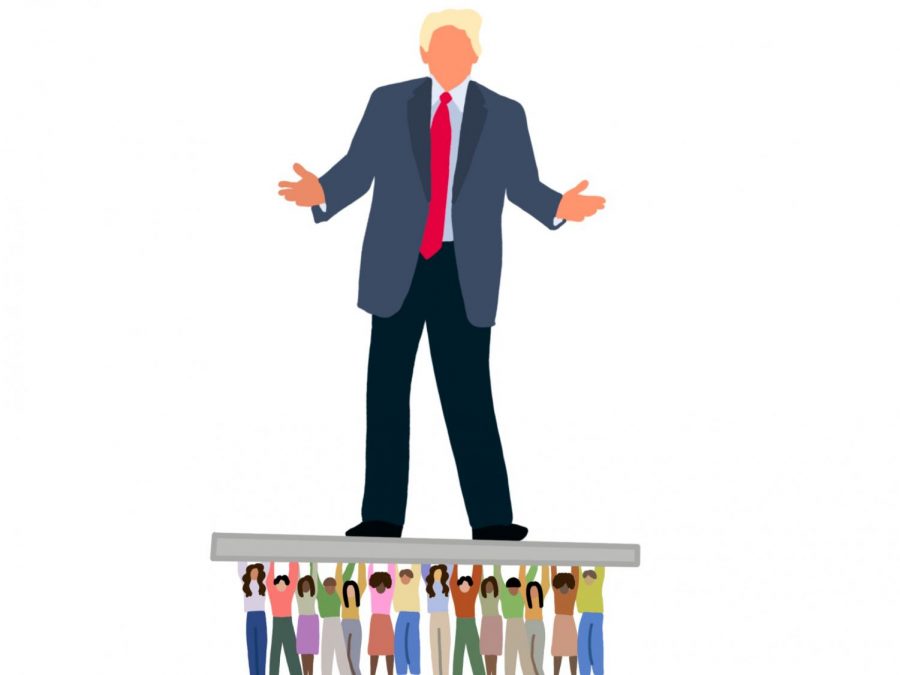When Rhetoric Matters
Analyzing the impact words can have on our politics, our discourse and our neighbors
A year of the pandemic, while giving us many hopeful examples of human resilience and ingenuity, has also extracted a great toll on American society. Aside from the obvious physical and financial toll that the pandemic and ensuing economic fallout has incurred—the over half a million dead and counting, the eviction and homelessness crisis, etc.—the pandemic has also exacerbated the growth of social divisions in America. Even early on in the pandemic, following basic safety guidelines like wearing a mask and social distancing in public became politicized and ingrained in the never-ending culture war between Republicans and Democrats. The pandemic also coincided with a record-high level of hate crimes in the United States overall, following a sharp increase after Trump’s election. And there’s evidence now that anti-Asian hate crimes specifically have shot up during the pandemic, as highlighted by the recent attack on several Asian-American women in Atlanta, Georgia.
I would argue that these increases in overall hate crimes, and anti-Asian attacks specifically, are due at least in part to the rhetoric of former President Trump. As an article published last week in the University News pointed out, Trump repeatedly went out of his way to blame China for the pandemic early on. He’s repeatedly referred to COVID-19 as the “China” or “Chinese” virus, or as “Kung Flu,” a phrase that many Asian-Americans have been openly uncomfortable with, and which some activists have described as fanning the flames of anti-Asian bigotry. Although it’s true that this sort of scapegoating is baked into American society and likely would have happened to at least some degree, it’s undeniable that Trump’s rhetoric contributed to a sentiment that the virus was either created by China on purpose somehow, or was simply caused by the lifestyle of the Chinese people. While I tend to avoid criticisms of Trump that center primarily on his tone and rhetoric, this is one area where the words of politicians really do matter, as it’s in times of crisis like a pandemic when presidents specifically are most important to national morale and the attitudes of the public.
Trump went on nonstop about the “China virus” for the same reason that he talked about building a wall between Mexico during the 2016 campaign: blaming foreigners for our problems is a cheap and easy way to score political points without actually fixing any of the problems. In a crisis like the pandemic, the words of politicians can have a real impact on people’s lives, and their actions even more so. Trump realized he could trick his base into thinking he handled COVID-19 perfectly and that it was all China’s fault anyway, but doing so meant rhetorically alienating an entire community of Americans—regardless of whether Trump was willing to acknowledge it or not. This isn’t a new phenomenon in American politics, however. Politicians have always used tropes about foreign countries or people from specific ethnic backgrounds as a way to distract the public from the real issues at hand. It’s much easier to win reelection if all the questions are about a war or a migrant caravan rather than things like homelessness or poverty, or how previous decisions led to current predicaments—like how Trump’s abolition of the Pandemic Response Team in 2018 made it harder for the U.S. to respond to the pandemic.
Although I think it’s unequivocally good that Trump is out of office, and that Biden certainly has better rhetoric, I don’t think the new administration is out of the woods quite yet. President Biden was elected on a promise to “restore the soul of the nation,” to return to “normal,” pre-Trump politics and to use more unifying language as president. Although he has certainly succeeded in this regard already, I don’t think having the right language alone is enough to eliminate these kinds of hate crimes in the long-run. Trump used hateful rhetoric to distract from his lackluster performance as president; if Biden doesn’t want to end up being accused of using good rhetoric to do the same, then he needs to fulfill the other core part of his campaign promises: passing bold, progressive legislation on a number of issues to address systemic inequalities and prevent mass shootings. During the campaign, Biden repeatedly talked about how he wanted to be the most progressive president since FDR, and even went so far as to hang a large portrait of FDR in the Oval Office. Despite this, he has failed to even propose many of the pieces of major legislation that he promised to pass in the first 100 days of his administration, including a comprehensive gun control bill which is intended to prevent tragedies like the Atlanta shooting. While Trump’s inconsiderate rhetoric is partly to blame for the recent uptick in hate crimes, especially towards Asian-Americans, it’s going to take more than the right rhetoric to heal the divisions within America and prevent crimes like the Atlanta shooting from taking place.
Your donation will support the student journalists of Saint Louis University.





